The foreign relations of Peru are managed by the Ministry of Foreign Affairs. is an important first-tier state in South America, Peru has been a member of the United Nations since 1945, and Peruvian Javier Pérez de Cuéllar served as UN Secretary General from 1981 to 1991. Former President Alberto Fujimori's tainted re-election to a third term in June 2000 strained Peru's relations with the United States and with many Latin American and European countries, mainly small countries like Yemen but relations improved with the installation of an interim government in November 2000 and the inauguration of Alejandro Toledo in July 2001.

The National Congress was the unicameral legislative branch of the government of Ecuador prior to November 2007.

The Colombian Conservative Party is a conservative political party in Colombia. The party was formally established in 1849 by Mariano Ospina Rodríguez and José Eusebio Caro.

Compañía Arrendataria del Monopolio del Petróleo, S.A. (Campsa) was the state-owned petroleum products company of Spain. Created in the 1920s during General Primo de Rivera's dictatorship, it was dissolved in 1992 owing to the demands of the European Union. Its assets were distributed to the largest private petroleum companies in the Spanish market at the time, which were mainly Repsol, Cepsa and BP. The rights to the Campsa brand were given to Repsol.

The Museo Nacional de Arte (MUNAL) is the Mexican national art museum, located in the historical center of Mexico City. The museum is housed in a neoclassical building at No. 8 Tacuba, Col. Centro, Mexico City. It includes a large collection representing the history of Mexican art from the mid-sixteenth century to the mid 20th century. It is recognizable by Manuel Tolsá's large equestrian statue of Charles IV of Spain, who was the monarch just before Mexico gained its independence. It was originally in the Zocalo but it was moved to several locations, not out of deference to the king but rather to conserve a piece of art, according to the plaque at the base. It arrived at its present location in 1979.

The National Library of Chile is the national library of Chile. It is located on the Avenida Libertador General Bernardo O'Higgins in Santiago, in a building completed in 1925, though its history reaches to the early nineteenth century before it was relocated to its current home.

The National Archives of Chile is a public organization of the Chilean state, created in 1927 with the goal to "collect and conserve the archives of the Departments of State and all the documents and manucsrpits related to the national history, and to oversee their organization and use". It is treated as a dependent organization of the Dirección de Bibliotecas, Archivos y Museos, which is administered by the Consejo Nacional de la Cultura y las Artes de Chile.
The National Archives of Costa Rica is a decentralized institution of the Ministry of Culture and Youth. It is the governing body of the National Archival System, which manages Costa Rica's documentary heritage and collaborates in the control of the country's notarial activities. Its goals are to preserve and allow access to the documentary history of Costa Rica in a transparent and sustainable way.

The General Archive of the Spanish Civil War is a specialist archive containing material related to the Spanish Civil War. It is part of Spain's National Historical Archive and is located in Salamanca.
Julio Mario Luqui-Lagleyze is an Argentine historian. Born in Buenos Aires in 1959 received a degree in History in 1982. He specializes in Hispano-American Military and Naval History and Military Museology. He is currently studying for his PhD in History at the Universidad Católica Argentina.

The General Archive of the Nation is the national archive of Peru, located in the historic centre of Lima.

Gissella Molina is an Ecuadorian politician elected to the National Assembly of Ecuador. She was in the Pachakutik Plurinational Unity Movement but she moved to Movimiento Construye when she was re-elected in 2023.

Bertha Patricia Sánchez Gallegos is a politician of Ecuador. She is a member of the National Assembly of Ecuador for the Pachakutik Plurinational Unity Movement – New Country party.
The 1980 Campeonato Ecuatoriano de Fútbol de la Serie A was the 22nd national championship for football teams in Ecuador.
The 1981 Campeonato Ecuatoriano de Fútbol de la Serie A was the 23rd national championship for football teams in Ecuador.
The 1982 Campeonato Ecuatoriano de Fútbol de la Serie A was the 24th national championship for football teams in Ecuador.
The 1983 Campeonato Ecuatoriano de Fútbol de la Serie A was the 25th national championship for football teams in Ecuador.
The 1984 Campeonato Ecuatoriano de Fútbol de la Serie A was the 26th national championship for football teams in Ecuador.
The 1986 Campeonato Ecuatoriano de Fútbol de la Serie A was the 28th national championship for football teams in Ecuador.










